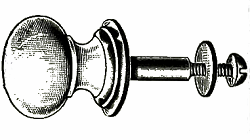 ‘…stupid as a doorknob…’ Just part of Luboš Motl’s vigorous attack on Scott Aaronson’s critique of IIT, the Integrated Information Theory of Giulio Tononi.
‘…stupid as a doorknob…’ Just part of Luboš Motl’s vigorous attack on Scott Aaronson’s critique of IIT, the Integrated Information Theory of Giulio Tononi.
To begin at the beginning. IIT says that consciousness arises from integrated information, and proposes a mathematical approach to quantifying the level of integrated information in a system, a quantity it names Phi (actually there are several variant ways to define Phi that differ in various details, which is perhaps unfortunate). Aaronson and Motl both describe this idea as a worthy effort but both have various reservations about it – though Aaronson thinks the problems are fatal while Motl thinks IIT offers a promising direction for further work.
Both pieces contain a lot of interesting side discussion, including Aaronson’s speculation that approximating phi for a real brain might be an NP-hard problem. This is the digression that prompted the doorknob comment: so what if it were NP-hard, demands Motl; you think nature is barred from containing NP-hard problems?
The real crux as I understand it is Aaronson’s argument that we can give examples of systems with high scores for Phi that we know intuitively could not be conscious. Eric Schwitzgebel has given a somewhat similar argument but cast in more approachable terms; Aaronson uses a Vandermonde matrix for his example of a high-phi but intuitively non-conscious entity, whereas Schwitzgebel uses the United States.
Motl takes exception to Aaronson’s use of intuition here. How does he know that his matrix lacks consciousness? If Aaronson’s intuition is the test, what’s the point of having a theory? The whole point of a theory is to improve on and correct our intuitive judgements, isn’t it? If we’re going to fall back on our intuitions argument is pointless.
I think appeals to intuition are rare in physics, where it is probably natural to regard them as illegitimate, but they’re not that unusual in philosophy, especially in ethics. You could argue that G.E. Moore’s approach was essentially to give up on ethical theory and rely on intuition instead. Often intuition limits what we regard as acceptable theorising, but our theories can also ‘tutor’ and change our intuitions. My impression is that real world beliefs about death, for example, have changed substantially in recent decades under the influence of utilitarian reasoning; we’re now much less likely to think that death is simply forbidden and more likely to accept calculations about the value of lives. We still, however, rule out as unintuitive (‘just obviously wrong’) such utilitarian conclusions as the propriety of sometimes punishing the innocent.
There’s an interesting question as to whether there actually is, in itself, such a thing as intuition. Myself I’d suggest the word covers any appealing pre-rational thought; we use it in several ways. One is indeed to test our conclusions where no other means is available; it’s interesting that Motl actually remarks that the absence of a reliable objective test of consciousness is one of IIT’s problems; he obviously does not accept that intuition could be a fall-back, so he is presumably left with the gap (which must surely affect all theories of consciousness). Philosophers also use an appeal to intuition to help cut to the chase, by implicitly invoking shared axioms and assumptions; and often enough ‘thought experiments’ which are not really experiments at all but in the Dennettian phrase ‘intuition pumps’ are used for persuasive effect; they’re not proofs but they may help to get people to agree.
Now as a matter of fact I think in Aaronson’s case we can actually supply a partial argument to replace pure intuition. In this discussion we are mainly talking about subjective consciousness, the ‘something it is like’ to experience things. But I think many people would argue that that Hard Problem consciousness requires the Easy Problem kind to be in place first as a basis. Subjective experience, we might argue, requires the less mysterious apparatus of normal sensory or cognitive experience; and Aaronson (or Schwitzgebel) could argue that their example structures definitely don’t have the sort of structure needed for that, a conclusion we can reach through functional argument without the need for intuition,
Not everybody would agree, though; some, especially those who lean towards panpsychism and related theories of ‘consciousness everywhere’ might see nothing wrong with the idea of subjective consciousness without the ‘mechanical’ kind. The standard philosophical zombie has Easy Problem consciousness without qualia; these people would accept an inverted zombie who has qualia with no brain function. It seems a bit odd to me to pair such a view with IIT (if you don’t think functional properties are required I’d have thought you would think that integrating information was also dispensable) but there’s nothing strictly illogical about it. Perhaps the dispute over intuition really masks a different disagreement, over the plausibility of such inverted zombies, obviously impossible in Aaronson’s eyes, but potentially viable in Motl’s?
Motl goes on to offer what I think is a rather good objection to IIT as it stands; ie that it seems to award consciousness to ‘frozen’ or static structures if they have a high enough Phi score. He thinks it’s necessary to reformulate the idea to capture the point that consciousness is a process. I agree – but how does Motl know consciousness requires a process? Could it be that it’s just… intuitively obvious?
